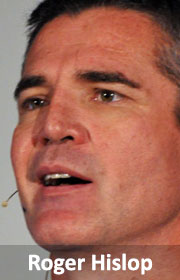 They’re coming for your Wi-Fi. They’re big, they’re infinitely rich, and they’re patient. And when they take your Wi-Fi, they’ll tell you that they did it for you. No, really, check out this video from Ericsson.
They’re coming for your Wi-Fi. They’re big, they’re infinitely rich, and they’re patient. And when they take your Wi-Fi, they’ll tell you that they did it for you. No, really, check out this video from Ericsson.
It’s taken some time for the strategy to become clear, but the world’s mobile network behemoths are well on the way to smothering technology competitors, undermining regulatory alternatives and carving up the wireless world to milk it until the end of time. Again.
Gloomy words? Fear mongering? Read on.
Unregulated spectrum, or more correctly licence-exempt spectrum … these so-called “ISM bands” can be used by anyone, with only the lightest touch of regulation.
They’re used for medical instruments, for welding plastics, for cooking your food. More importantly, they’re used for wireless radio: Wi-Fi, Bluetooth and Zigby, for example.
There’s 80MHz of spectrum at 2,4GHz, and 150MHz at 5GHz. Depending on the country, there’s 300MHz to 500MHz more at 5GHz in the so-called “UNII bands”. In other words, there’s lots of lovely spectrum in desirable bands while mobile operators pay billions to get 20MHz or 30MHz at a time.
Two years back, Qualcomm — soon joined by Ericsson — proposed LTE-U , or LTE for unlicensed spectrum. Initially, this caused a huge schism amongst telecoms majors, not because the mobile operators had qualms about carving up the “digital commons” of ISM, but because some had built major Wi-Fi hotspot businesses (hello, AT&T).
At the recent Mobile World Congress, LTE-U was the big news of the show — and for mobile operators there’s a lot to love. And they’re particularly enamoured of the idea of something called “licence-assisted access”, or LAA. The idea is that operators use their existing licensed spectrum and bond this with extra capacity from the ISM bands to give their subscribers faster downloads.
In theory, LTE is a better technology than Wi-Fi — it makes more efficient use of spectrum, and of course integrates with the operator’s mobile core for management and billing. However, despite what proponents claim, the efficiency of LTE is not overwhelmingly higher. Depending on implementation, numbers from 60% to ambitious three-digit percentage gains are thrown around, but getting a solid number is hard.
Some studies compare LTE-U with the Wi-Fi 802.11n standard (not the much faster 802.11ac). Some are optimistic theoretical models, not real-world measurements. Most are talking about single-operator environments, conveniently avoiding the issue that LTE-U efficiency falls off if there’s inter-operator interference.
LTE was designed to work in exclusive spectrum. Wi-Fi was specifically designed to work in a soup of competing transmissions. So, while the technical development is rapid, with LTE-U (or in its release 13 incarnation, LAA) being retrofitted with “listen before talk” functionality, it’s papering over the cracks.
The truth is one must always take what the mobile industry claims in performance advantages with a giant pinch of the saltiest salt you can find. Remember the “4G will give you 100Mbit/s easy” we were sold by the operators? The most recent Cisco VNI study shows LTE peaking in actual average throughput at about 14Mbit/s. And that’s assuming you can get a reliable connection from this “carrier grade” technology.
Bottom line, however, is this: there’s a fat pie of spectrum that mobile operators want a slice of because the bands they’ve paid billions of dollars for are full. And they have billions of dollars in revenue they need to keep coming in. So the ISM bands are in their crosshairs.
Is this in the interest of telecoms users? No. Wi-Fi works. It works brilliantly. It is orders of magnitude cheaper to deploy, is already carrying 37 exabytes of traffic annually worldwide, or about 30 exabytes more than mobile.
Wi-Fi is terrifying to the mobile operators. Wi-Fi is increasingly free… or a fraction of the cost of mobile. Almost every tech device has a Wi-Fi connection as standard. The LTE networks cost operators a fortune to deploy – and they are realising less and less margin all the time. Mobile operator voice revenues? Already heading south, and soon to fall off a cliff. The Cisco VNI study predicts voice over Wi-Fi will overtake voice over LTE before 2018.

Microsoft smartphones will detect automatically if the person being called has Skype, and transparently hand a voice call from the mobile network to Skype. It’s just announced a big push of Skype installed by default on popular Android devices, including Samsung and Dell. WhatsApp, the texting app that blew the incredibly lucrative SMS market into the bushes, has just launched voice calling. All free.
Licence-exempt wireless access — Wi-Fi — has been the single greatest success of a genuinely efficient and competitive free market, with light-touch regulation, and no lock-out oligopolies created by governments arbitrarily deciding spectrum is theirs to parcel out.
Three billion consumer electronic devices are shipped every year with Wi-Fi — 70% of the total consumer electronics market. Ten billion Wi-Fi devices have been sold in total, as have 3bn Bluetooth devices.
It’s a meritocracy, where good technology, good service, good prices, flexibility and choice wins. It’s the antithesis of the mobile operator world, which has ruthlessly milked its exclusive licences to the tune of $1,2 trillion a year.
So what’s to be done? The very factors that make Wi-Fi a success are its greatest weakness: it’s fragmented and uncoordinated. The mobile industry is fantastically well organised, with a powerful lobbying machine (the GSMA) and its own pet global regulator, the International Telecommunication Union.
The battle has been joined, albeit on the quiet. The Wi-Fi Alliance has started making noises, but too cautiously. Locally, the Wireless Access Providers’ Association and the Wi-Fi Forum are trying to martial their limited resources.
There’s no doubt this industry is at a tipping point. Either the mobile operator hegemony will be broken or we’re at the start of a brand new era of these operators’ total domination of wireless communications.
- Roger Hislop is an engineer in the research and innovation group at Internet Solutions. He writes here in his private capacity

